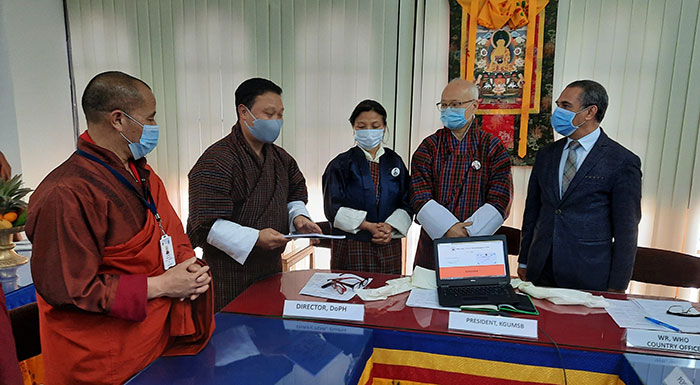SCC will take home-bound service to the doorsteps of NCD patients
Younten Tshedup
Health workers in the country will hereafter reach out to non-communicable disease (NCD) patients, who are incapable of visiting hospitals for their routine check-ups due to their medical conditions.
The home-bound service is one of seven components of the revamped Service with Care and Compassion (SCC) programme, which the health ministry launched in 2019 as a people-centred care programme in four dzongkhags.
Under the SCC programme, health workers are tasked to follow up and send reminder calls to NCD patients and also facilitate their medicine refills at primary health care levels without the patients having to do all these activities.
Health workers will also arrange and facilitate referrals for patients, seek appointments with consulting doctors, and discuss the laboratory works, such as what kind of tests would be required, prior to seeing a medical doctor.
With the successful implementation of the programme in Tsirang, Wangdue, Punakha, and Zhemgang, the SCC programme is being now rolled out to five more dzongkhags — Dagana, Trongsa, Gasa, Bumthang, and Mongar.
To equip and build the capacity of health workers in these dzongkhags, the health ministry and the Khesar Gyalpo University of Medical Sciences of Bhutan (KGUMSB) launched an online course for health workers yesterday.
Experts and faculty members from KGUMSB have developed a comprehensive module to train health workers under the programme. The training would be conducted virtually, with support from the World Health Organisation’s country office.
Deputy chief programme officer with the NCD division, Laigden Dzed, said that SCC was an attempt to allow health workers to go beyond the usual ‘provider-driven’ services to need-based (of patients) services.
“Health workers must go beyond just prescribing drugs. They should ensure the patients are well treated and receive all the care and compassion they need,” he said, adding that health services should not be restricted only to health facilities and those who sought it.
With the growing concerns over increasing NCD cases in the country, he said that, if timely intervention was not provided, NCDs would have a huge implication on the country’s health system.
The diseases are already causing major disruption in the health sector. NCDs, including hypertension, cardiovascular diseases, cancer, and diabetes, accounted for 71 percent of the reported deaths in 2019, according to the annual health bulletin 2020.
Senior programme officer with the lifestyle-related disease programme of the health ministry, Kinley Wangchuk, said that one in four Bhutanese was hypertensive today. “The more concerning thing was that seven in ten hypertensive individuals didn’t know they had hypertension.”
He said that, under the SCC programme, every individual visiting hospitals and health care centres would be screened for NCDs hereafter. “This is to enable early detection among the risky population and those who are unaware of their NCD status.”
Kinley Wangchuk said that, besides enabling an early detection system among people, the programme would also allow a well-coordinated, continued and comprehensive care for those who are already living with NCDs.
He said that this would strengthen the primary health care system in the country and make it more comprehensive, which would include all aspects of curative, preventive, and treatment care, including a human touch.
For example, he said that, in the past, sick patients had to struggle with the long procedure of fixing appointments with doctors and seeking laboratory tests. “Now, under SCC, the health workers would facilitate all these procedures and make things as easy as possible for the patient.”
Director of the Department of Public Health, Dr Karma Lhazeen, said that, although Bhutan was one of the first countries to pilot WHO’s Package of Essential Non-communicable (PEN) disease interventions in 2010, the clinical auditing in 2016 revealed that the quality of health service was lacking in the system.
She said that, while the access to health services and equity was fairly good, the country lacked quality service. “In terms of universal health coverage, the length and breadth of services only aren’t adequate. We have to get into the depth of the problem, too. And this depth comes when we address the quality issue.”
Dr Karma Lhazeen said that SCC brings in the humane aspect to the health care services. “The programme brings the health workers and patients close and helps build trust between the two.”
KGUMSB’s president, Dr Kinzang P Tshering, said that, over the years, the NCD burden had been growing in the country. “People living with NCDs are already struggling, especially those in rural parts of the country,” he said. “Taking health care to the doorsteps of these patients is a big paradigm shift and positive one.”
According to the second NCD risk factor survey report 2019, 11.4 percent of Bhutanese were obese and 33.5 percent were overweight. The prevalence of raised blood pressure, blood sugar and cholesterol were recorded at 28 percent, 1.9 percent and 11.1 percent, respectively.


